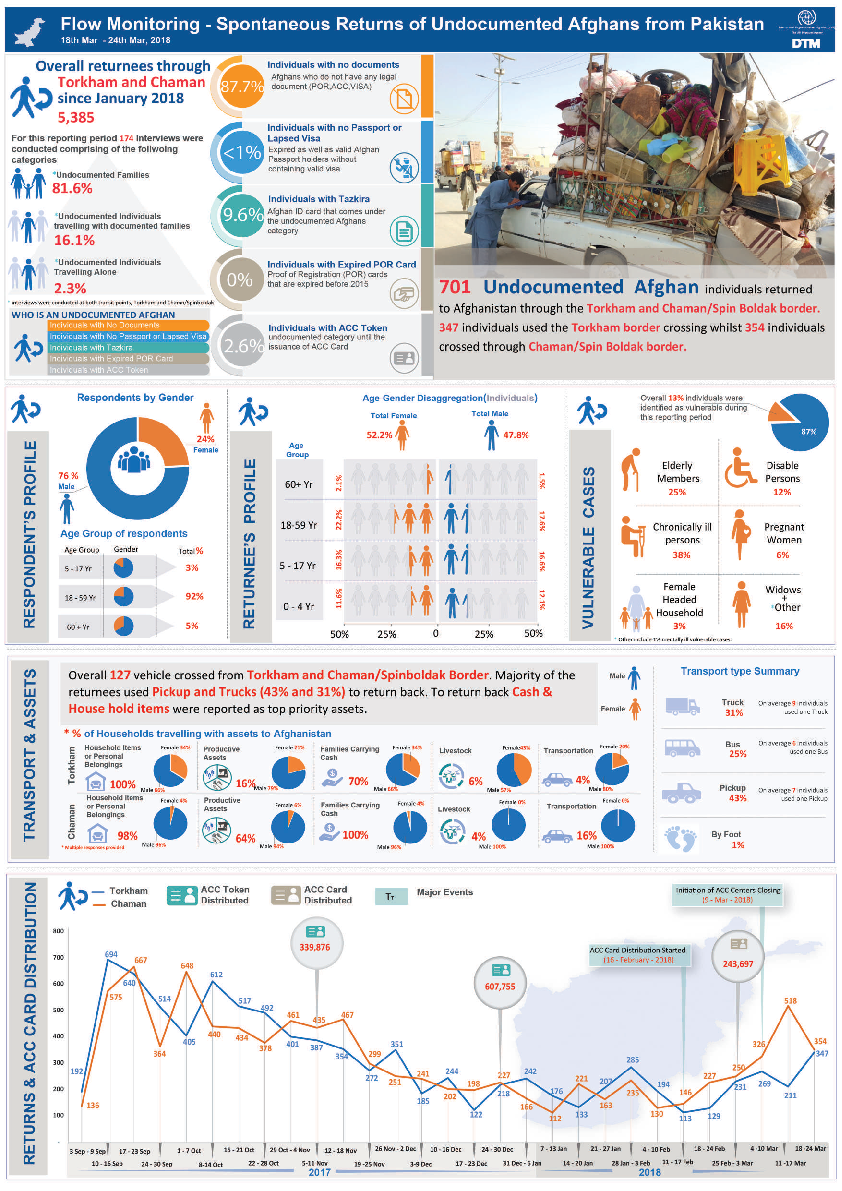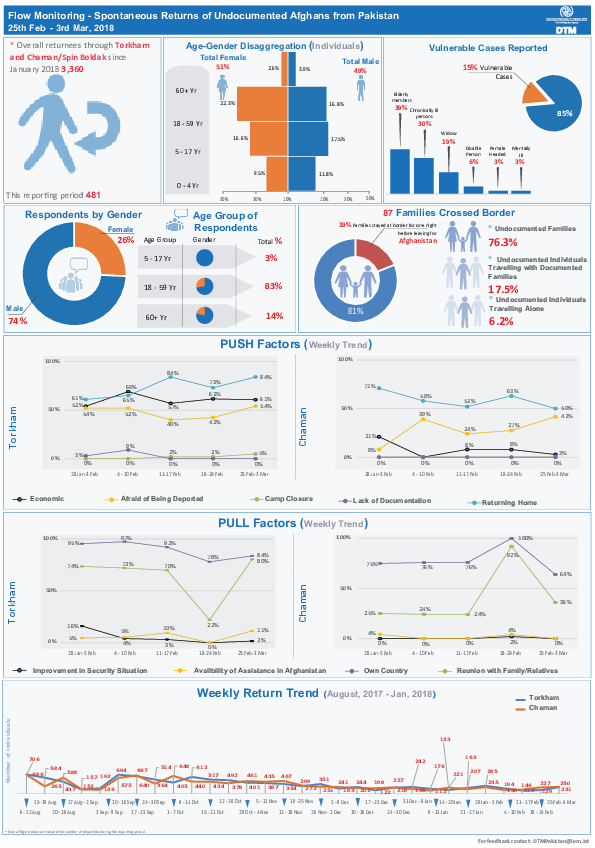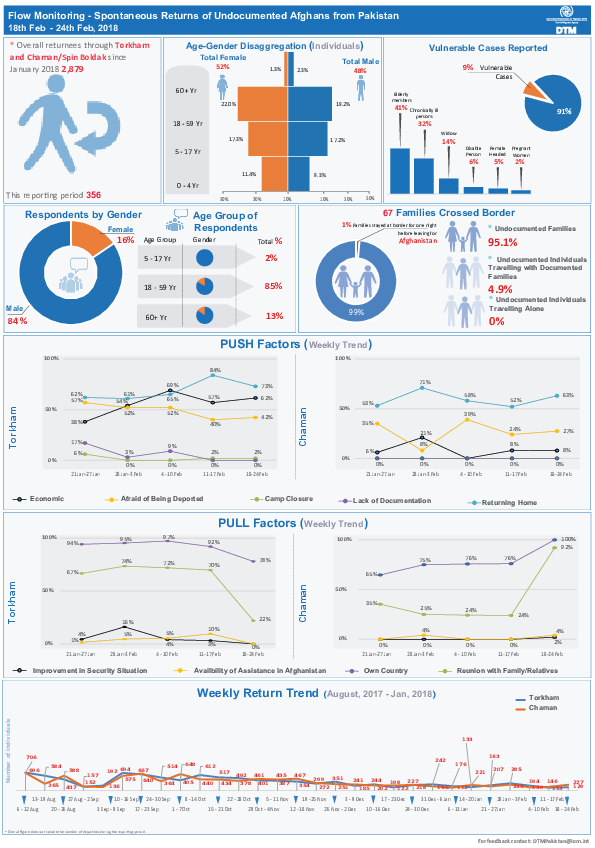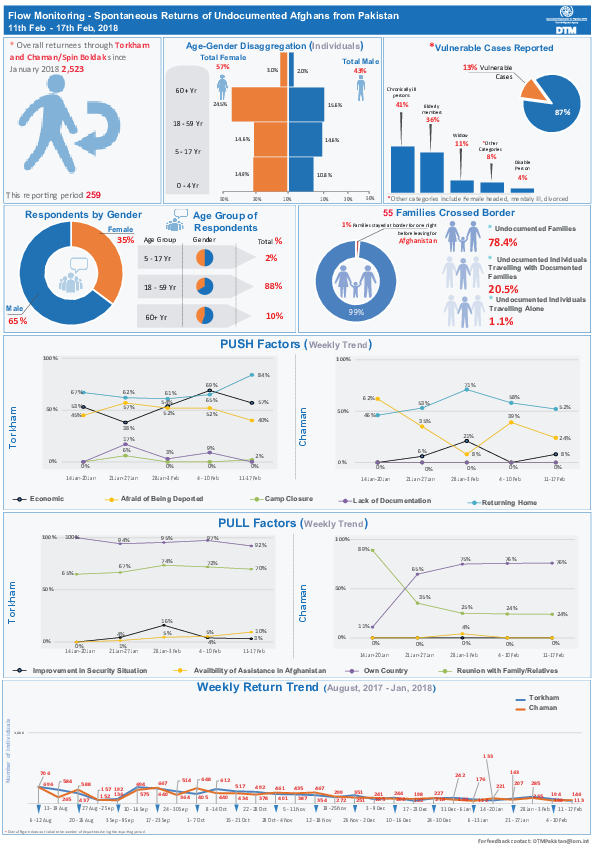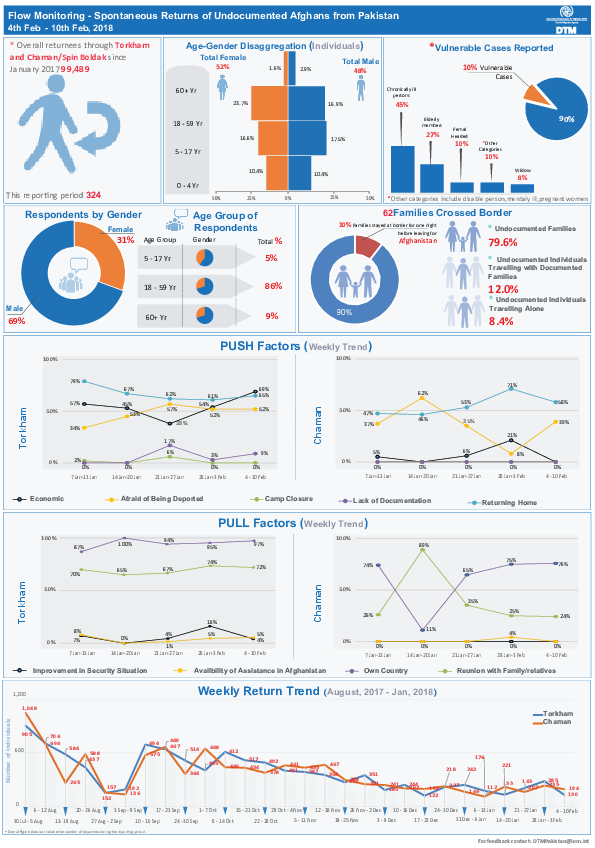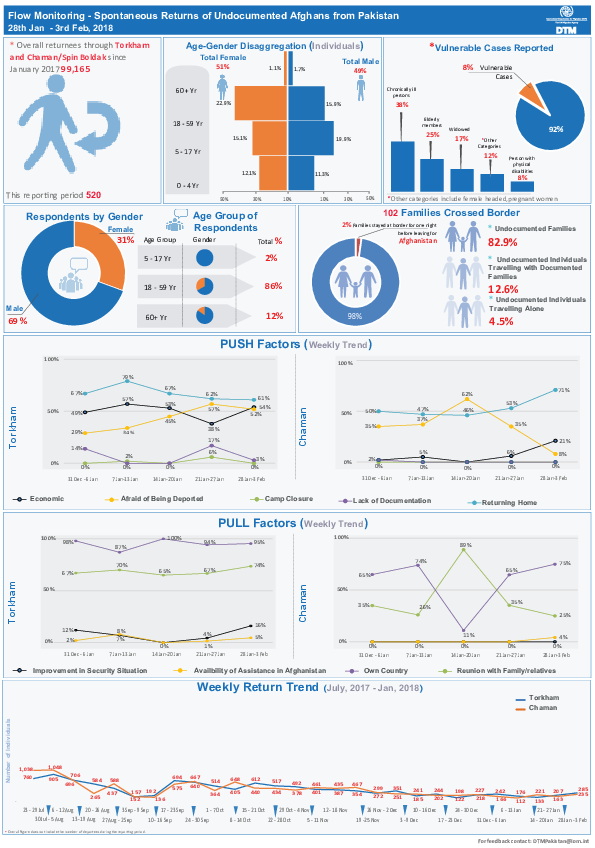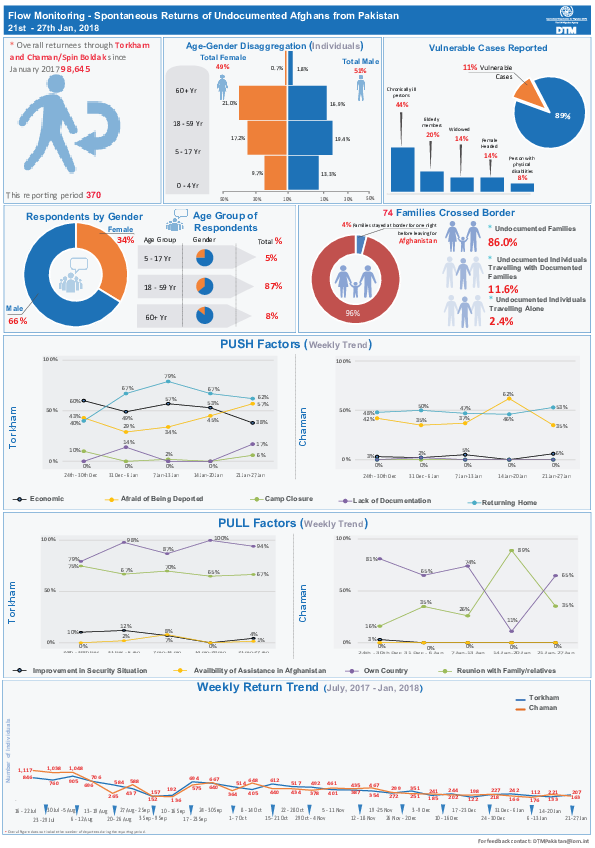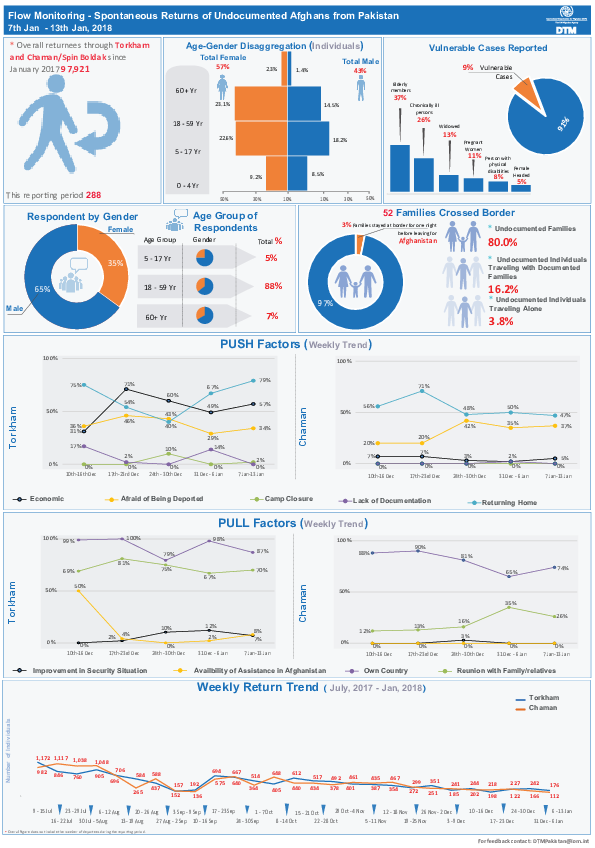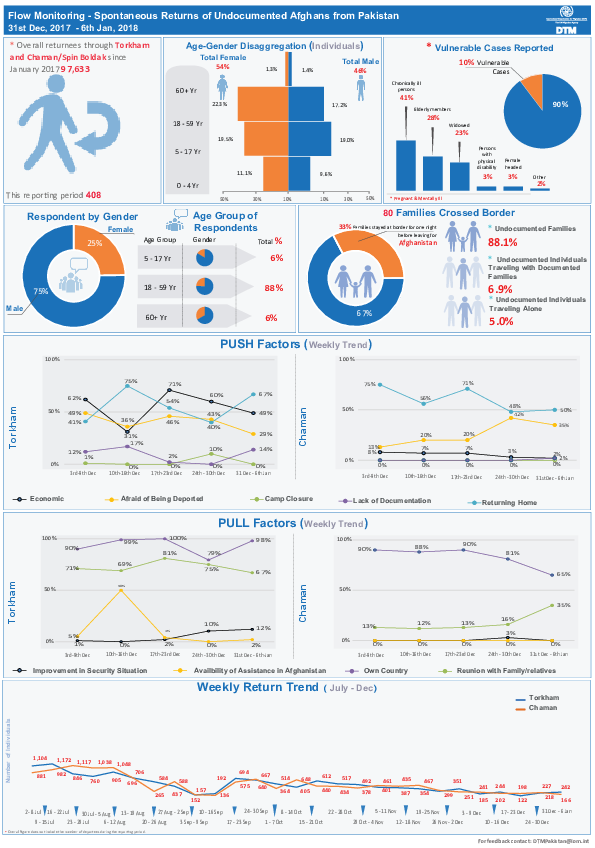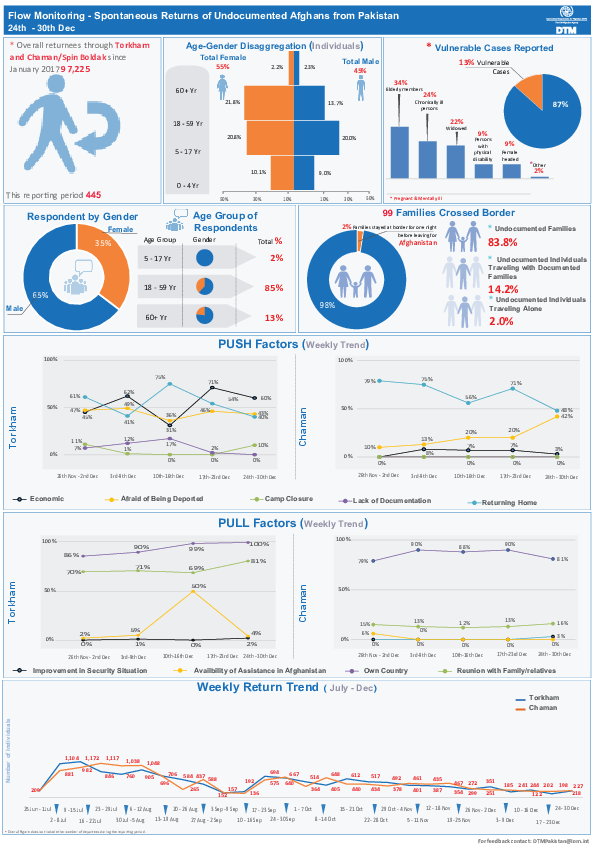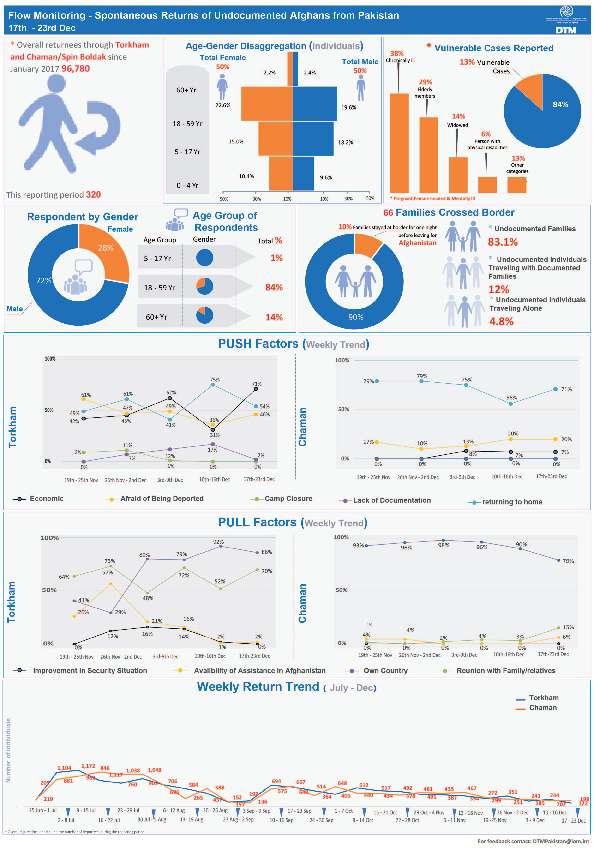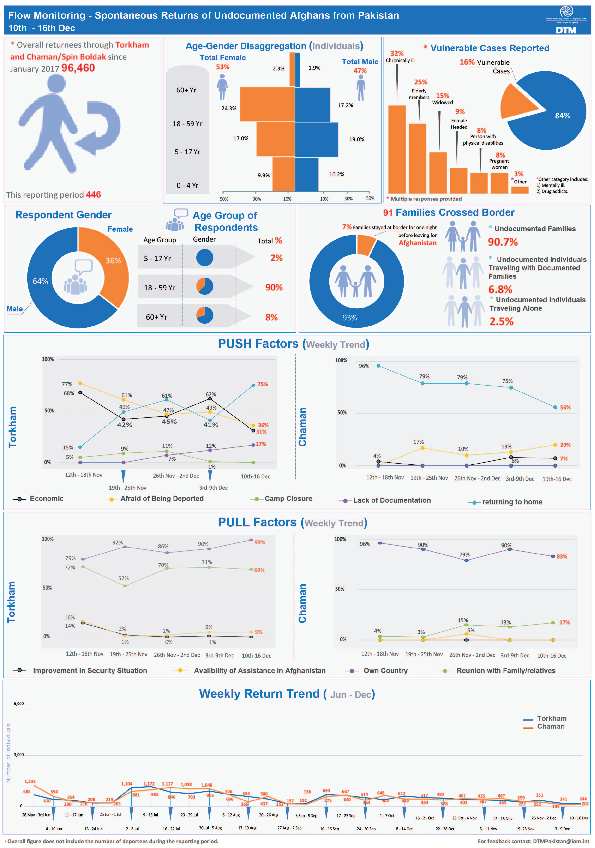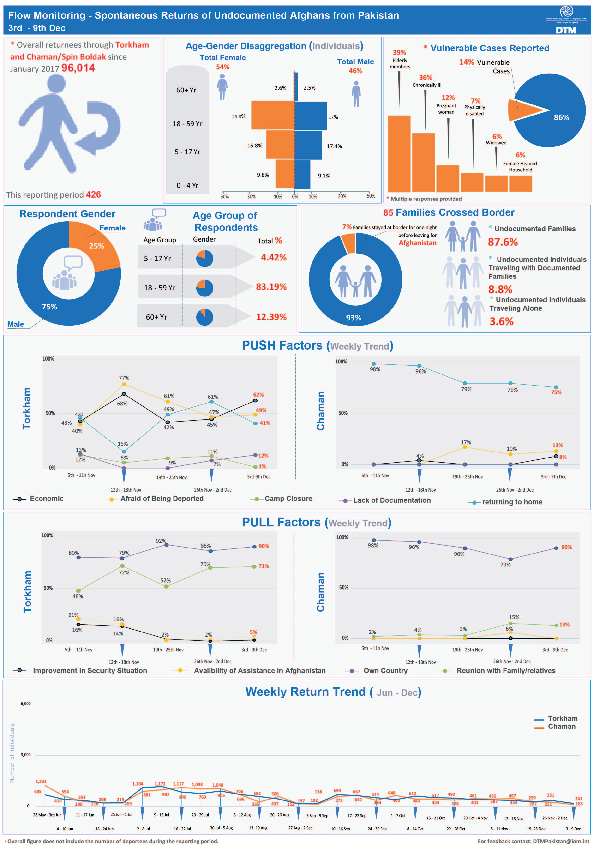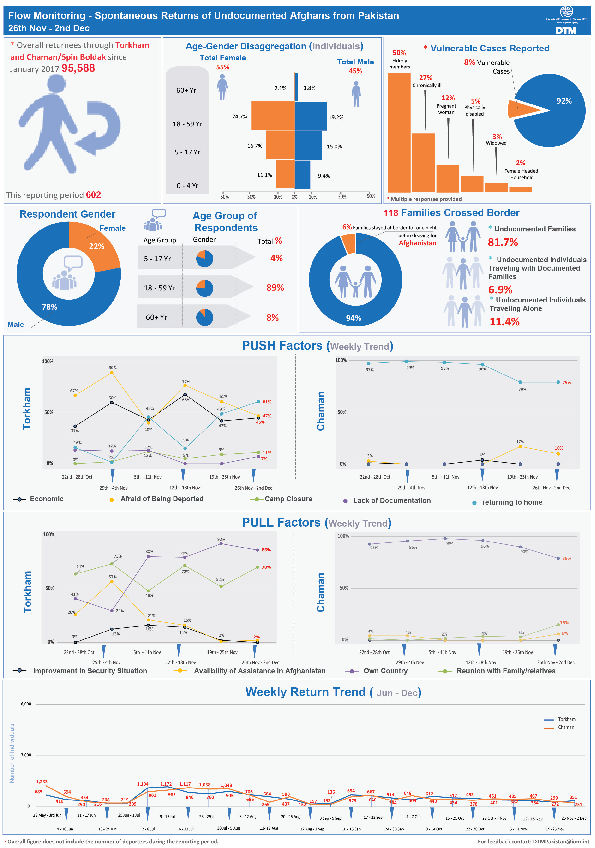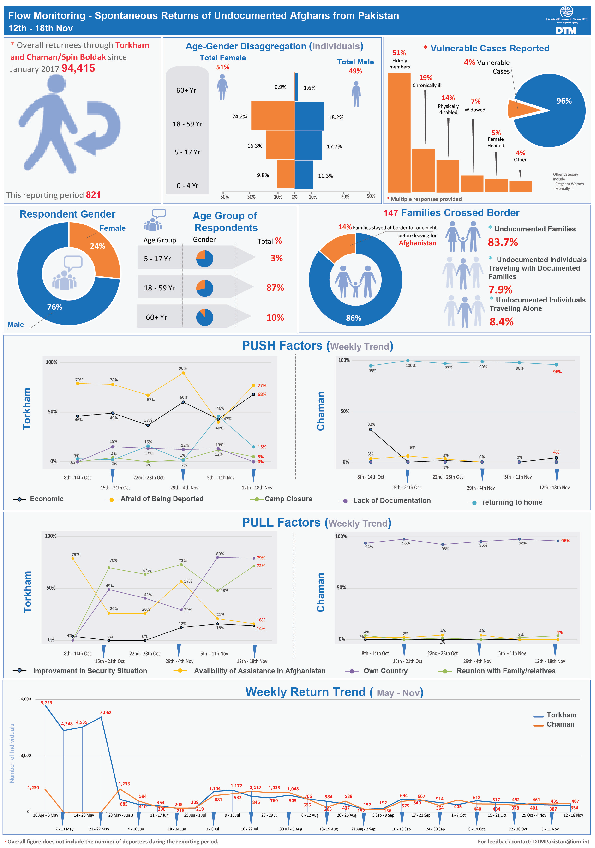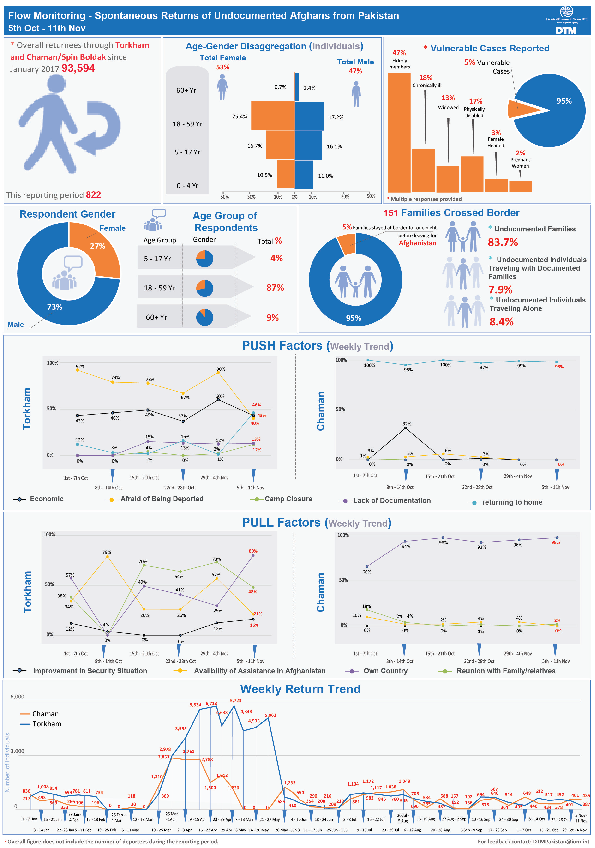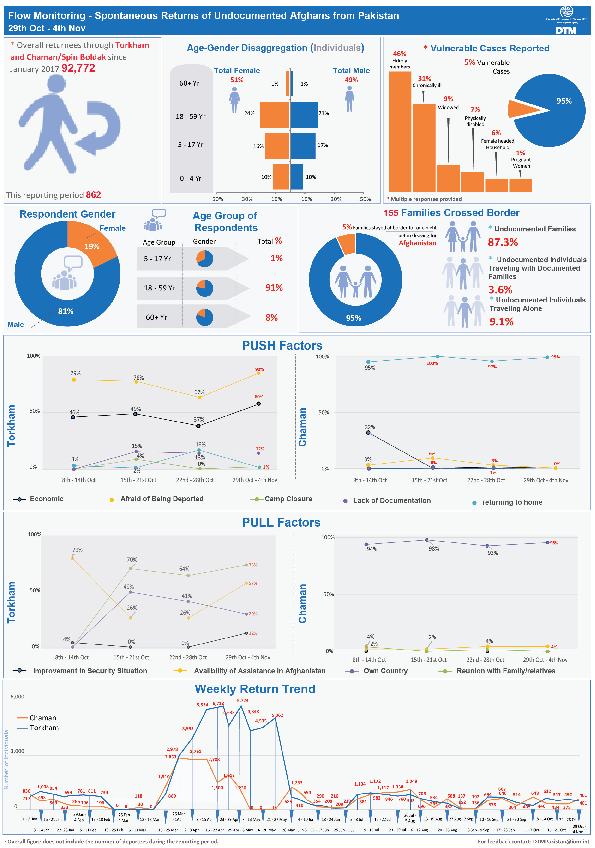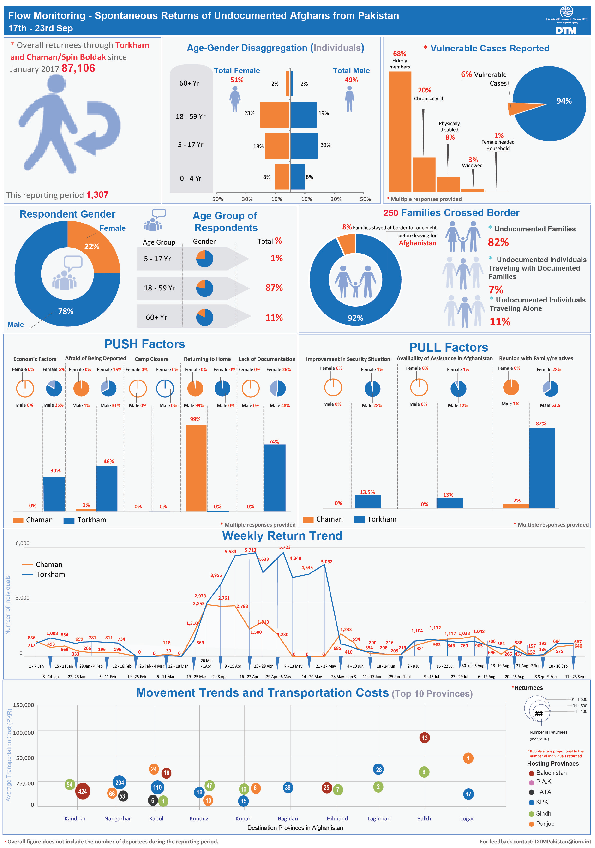-
Countries
-
Data and Analysis
-
Special Focus
-
Crisis Responses
Pakistan
Pakistan
TDPs tracked
Mouvements de déplacement
23,000
IDMC 2023
cycle de collecte de données
À propos Pakistan
In 2010, IOM’s Displacement Tracking Matrix (DTM) programme started its activities in Pakistan as part of IOM’s emergency flood response programme. Over the years, DTM has evolved into a comprehensive programme covering a wide range of activities. The DTM programme works closely together with a wide array of stakeholders, including government ministries and national and sub-national statistical organizations, UN agencies, and specialized research institutes. Its activities are instrumental in providing stakeholders with an evidence-base to effectively address humanitarian, transition, and development needs within the country.
In 2017, DTM started the implementation of its Flow Monitoring (FM) activities. DTM collects FM data at the Torkham (Khyber Pakthunkhwa), Chaman, Badini and Bahramcha (Balochistan) border crossing points (BCPs) to identify cross-mobility patterns and profiles of Afghans who are returning from Pakistan to Afghanistan. The data presented in FM information products is harmonized with those from the United Nations High Commissioner for Refugees (UNHCR), who also cover Ghulam Khan (Khyber Pakhtunkhwa). DTM Pakistan also actively coordinates its data collection efforts with the DTM programme in Afghanistan.
As part of the 2022 flood response, DTM launched mobility tracking operations in flood-affected settlements or settlements that hosted temporary displaced persons (TDPs) across 11 districts in Balochistan and Sindh to provide partners with timely information on the displacement situation. Since then, DTM’s mobility tracking has expanded to cover 30 districts across three provinces (Balochistan, Sindh and Khyber Pakhtunkhwa) and collects information on the multisectoral needs and recovery needs at the settlement level, in addition to the displacement situation.
In May 2023, DTM scaled-up its mobility tracking efforts to support the ongoing response efforts for Afghans in Pakistan. DTM’s Afghan response has been implemented in 33 districts across Balochistan, Khyber Pakhtunkhwa, Islamabad, Punjab, and Sindh, and aims to provide stakeholders with up-to-date information on the multisectoral needs of Afghans in the country.
Furthermore, under the European funded project “Displacement Tracking Matrix Regional Evidence for Migration Analysis and Policy (DTM REMAP), from 2019 to 2022, DTM implemented two household surveys. The first survey was the survey on Drivers of Migration (SDM) which aimed at better understanding the drivers of Pakistani international out-migration. The second survey was the “Returnee Longitudinal Survey (RLS)”. The purpose of RLS was to improve understanding of return migrants’ profiles, vulnerabilities and needs, as well as sustainable return and reintegration outcomes in the short- and medium-term.
Contacter
DTM Pakistan
DTMPakistan@iom.int
Bailleurs de fonds
- EU-INTPA
- ECHO
- Ministry of Foreign Affairs of Italy
- PRM
- Canada – IRCC
- Canada (DFATD)
- Netherlands
Pakistan — Flow Monitoring of Undocumented Afghan Returnees from Pakistan (18—24 March 2018)
In the period between 18—24 March 2018, 354 Undocumented Afghan individuals returned to Afghanistan through the Chaman/Spin Boldak border crossing whilst 347 individuals used the Torkham border crossing, bringing the total number of returns this week to 701 (138 families).
Pakistan — Flow Monitoring of Undocumented Afghan Returnees from Pakistan (25 February — 3 March 2018)
In the period between 25 February — 3 March 2018, 250 Undocumented Afghan individuals returned to Afghanistan through the Chaman/Spin Boldak border crossing whilst 231 individuals used the Torkham border crossing, bringing the total number of returns this week to 481 (87 families).
Pakistan — Flow Monitoring of Undocumented Afghan Returnees from Pakistan (18—24 February 2018)
In the period between 18-24 February 2018, 227 Undocumented Afghan individuals returned to Afghanistan through the Chaman/Spin Boldak border crossing whilst 129 individuals used the Torkham border crossing, bringing the total number of returns this week to 356 (67 families).
Pakistan — Flow Monitoring of Undocumented Afghan Returnees from Pakistan (11—17 February 2018)
146 undocumented Afghan individuals returned to Afghanistan through the Chaman/Spin Boldak border crossing whilst 113 individuals used the Torkham border crossing, bringing the total number of returns this week to 259 (55 families).
Pakistan — Flow Monitoring of Undocumented Afghan Returnees from Pakistan (4—10 February 2018)
During the week of 4-10 February 2018, 324 undocumented Afghan individuals returned to Afghanistan through the Torkham and Chaman/Spin Boldak border crossings. There is an approximate 60% decrease in the total number of returns as compared to last week.
Pakistan — Flow Monitoring of Undocumented Afghan Returnees from Pakistan (28 January — 3 February 2018)
285 undocumented Afghan individuals returned to Afghanistan through the Torkham border crossing whilst 235 individuals used the Chaman/Spin Boldak border crossing, bringing the total number of returns this week to 520 (102 families).
Pakistan — Flow Monitoring of Undocumented Afghan Returnees from Pakistan (21—27 January 2018)
Since January 2017, overall, 98,645 returnees have been reported returning through Torkham and Chaman/Spin Boldak. Between 21-27 January 2018, 370 returnees were recorded.
Pakistan — Flow Monitoring of Undocumented Afghan Returnees from Pakistan (7—13 January 2018)
Since January 2017, overall, 97,921 returnees have been reported returning through Torkham and Chaman/Spin Boldak. Between 7-13 January 2018, 288 returnees were recorded. Out of the total number of returns during the present reporting period, 57% returnees were female whereas 43% were male.
Pakistan — Flow Monitoring of Undocumented Afghan Returnees from Pakistan (31 December 2017 — 6 January 2018)
Since January 2017, overall, 97,633 returnees have been reported returning through Torkham and Chaman/Spin Boldak. Between 24-30 December, 242 returnees were recorded. Out of the total number of returns during the present reporting period, 54% returnees were female whereas 46% were male.
Pakistan — Flow Monitoring of Undocumented Afghan Returnees from Pakistan (24—30 December 2017)
Since January 2017, overall, 97,225 returnees have been reported returning through Torkham and Chaman/Spin Boldak. Between 24-30 December, 445 returnees were recorded.
Pakistan — Flow Monitoring of Undocumented Afghan Returnees from Pakistan (17—23 December 2017)
Since January 2017, overall, 96,780 returnees have been reported returning through Torkham and Chaman/Spin Boldak. Between 17-23 December, 320 returnees were recorded.
Pakistan — Flow Monitoring of Undocumented Afghan Returnees from Pakistan (10—16 December 2017)
Since January 2017, overall, 96,460 returnees have been reported returning through Torkham and Chaman/Spin Boldak. Between 10-16 December, 446 returnees were recorded.
Pakistan — Flow Monitoring of Undocumented Afghan Returnees from Pakistan (3—9 December 2017)
Since January 2017, overall, 96,014 returnees have been reported returning through Torkham and Chaman/Spin Boldak. Between 3-9 December, 426 returnees were recorded.
Pakistan — Flow Monitoring of Undocumented Afghan Returnees from Pakistan (26 November — 2 December 2017)
351 Undocumented Afghan individuals returned to Afghanistan through the Torkham border crossing whilst 251 individuals used the Chaman/Spin Boldak border crossing, bringing the total number of returns this week to 602 (118 families).
Pakistan — Flow Monitoring of Undocumented Afghan Returnees from Pakistan (19—25 November 2017)
Since January 2017, overall, 94,986 returnees have been reported returning through Torkham and Chaman/Spin Boldak. Between 19-25 November, 571 returnees were recorded.
Pakistan — Flow Monitoring of Undocumented Afghan Returnees from Pakistan (12—18 November 2017)
Since January 2017, overall, 94,415 returnees have been reported returning through Torkham and Chaman/Spin Boldak. Between 12-18 November, 821 returnees were recorded.
Pakistan — Flow Monitoring of Undocumented Afghan Returnees from Pakistan (5—11 November 2017)
Since January 2017, overall, 93,594 returnees have been reported returning through Torkham and Chaman/Spin Boldak. Between 5-11 November, 822 returnees were recorded. Main push factors are returning to home and economic, while the main pull factor was returning to own country.
Pakistan — Flow Monitoring of Undocumented Afghan Returnees from Pakistan (29 October — 4 November 2017)
Since January 2017, overall, 92,722 returnees have been reported returning through Torkham and Chaman/Spin Boldak. Between 29 October and 4 November, 862 returnees were recorded.
Pakistan — Flow Monitoring of Undocumented Afghan Returnees from Pakistan (8—14 October 2017)
Since January 2017, overall, 90,089 returnees have been reported returning through Torkham and Chaman/Spin Boldak. Between 8—14 October, 1,052 returnees were recorded.
Pakistan — Flow Monitoring of Undocumented Afghan Returnees from Pakistan (15—21 October 2017)
Since January 2017, overall, 91,040 returnees have been reported returning through Torkham and Chaman/Spin Boldak. Between 15—21 October, 951 returnees were recorded. Main push factor in Torkham was fear of being deported while the main push factor in Chaman was returning home.
Pakistan — Flow Monitoring of Undocumented Afghan Returnees from Pakistan (17—23 September 2017)
Since January 2017, overall, 87,190 returnees have been reported returning through Torkham and Chaman/Spin Boldak. Between 17—23 September, 1,307 returnees were recorded.
Pakistan — Flow Monitoring of Undocumented Afghan Returnees from Pakistan (13-19 August 2017)
584 undocumented Afghan individuals returned to Afghanistan through the Torkham border crossing whilst 265 individuals used the Chaman/Spin Boldak border crossing, bringing the total number of returns this week to 849 (144 families). This is an approximate 39% decrease as compared to last week.
Pakistan — Flow Monitoring of Undocumented Afghan Returnees from Pakistan (6–12 August 2017)
1,402 Undocumented Afghan individuals returned to Afghanistan through the Torkham and the Chaman/Spin Boldak border crossing during the reporting period bringing the overall number of returnees since January 2017 to 82,019 individuals.
Pakistan — Flow Monitoring of Undocumented Afghan Returnees from Pakistan (30 July — 5 August 2017)
905 Undocumented Afghan individuals returned to Afghanistan through the Torkham border crossing whilst 1,048 individuals used the Chaman/Spin Boldak border crossing, bringing the total number of returns this week to 1,953 (323 families).


